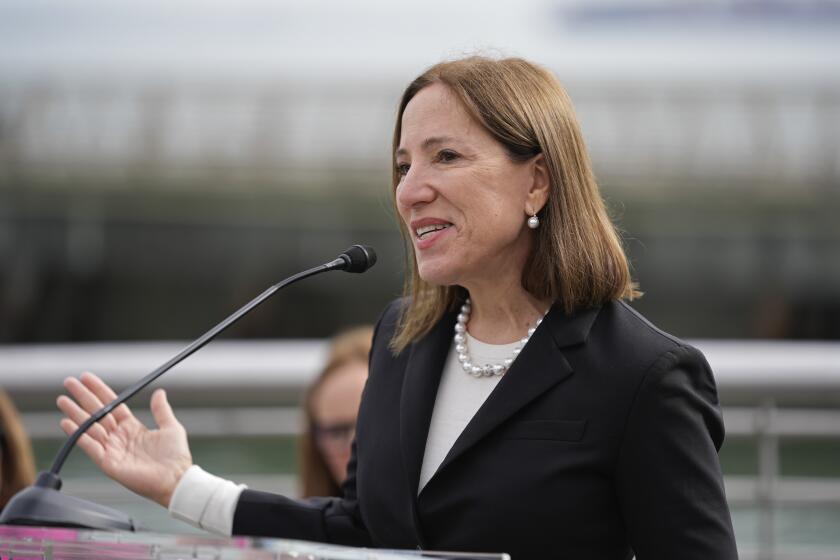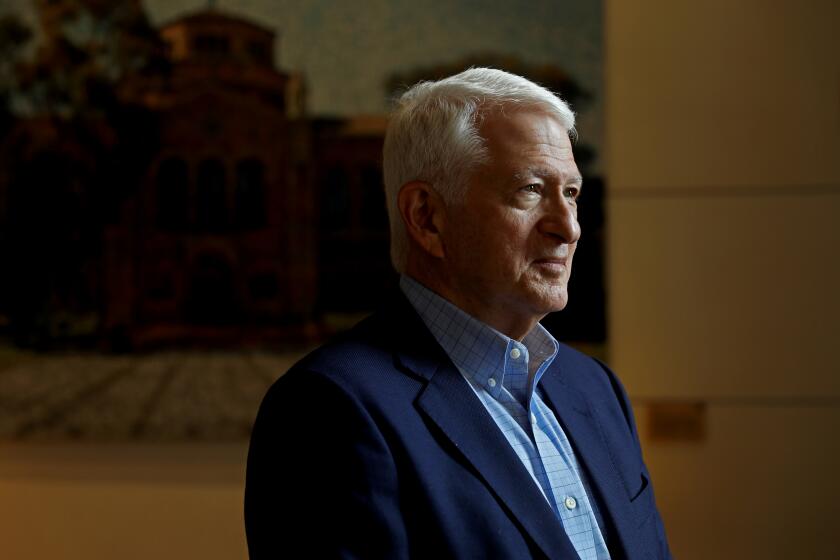LOCAL ELECTION / CHARTER AMENDMENT G : Debate Waged on ‘Buy American’ Issue
Economists and business leaders opposed to the “Buy American” measure on Tuesday’s ballot say its passage could drive away foreign investment needed to help rebuild Los Angeles after the riots.
“We simply cannot afford this measure now because we need all the allies we can get,” said David Friedman, an attorney with the law firm Tuttle & Taylor and research fellow at Massachusetts Institute of Technology’s Japan Program.
“It was a silly idea to begin with--the product of political expediency and anti-Japanese hysteria that swept the nation,” Friedman said. “Now, Los Angeles has to be more sensitive about offending foreign interests that can help rebuild the city.”
Jack Kyser, chief economist at the Economic Development Corp., a nonprofit group trying to stimulate the Los Angeles County economy, said, “If we buy American, that will help South Los Angeles--not!
“We’ve a bunch of unfortunate experiences in South Los Angeles but in order to help that area we need a good business environment,” Kyser said. “We need to encourage industry to go there, we need federal enterprise zones and we need to get back to the fact that we still have a lousy business environment in California.”
Ray Remy, president of the Los Angeles Area Chamber of Commerce, agreed. He said the measure could send the wrong message to foreign companies worried about investing in a city whose image has been tarnished by widespread rioting viewed on television around the world.
“It’s just bad for business,” Remy said. “We’re going to need folks to come to Los Angeles, stay and invest.”
But City Councilman Zev Yaroslavsky, who sponsored the measure to give a bidding edge to local firms and establish a domestic content requirement for city purchases, said he hasn’t changed his views on the importance of instituting the charter amendment to protect local jobs.
He said firms are being forced to move because the continuing recession and the city’s array of taxes and stringent environmental protection, occupational safety and workers’ compensation laws.
“I’m tired of seeing jobs leave Los Angeles,” Yaroslavsky said. “What we’re saying is . . . let the city use its purchasing leverage to help its hometown industries and employers.
“When you’re buying pencils or vehicles or construction contracts, why not buy the ones that are local, which produces jobs and enhances the tax base in Southern California.”
Yaroslavsky also insisted that no firms would be disqualified from city contracts just because they are located out of state or overseas.
As it stands, the city is required to award contracts to the lowest responsible bidder.
Still, opponents have serious doubts about the proposal that was authored in the heat of political rhetoric surrounding the Los Angeles County Transportation Commission’s decision to award a $128-million Green Line contract to Sumitomo Corp. of America. That contract was later canceled amid an outburst of public discontent.
Of particular concern is the difficulty in determining the U.S. content level of products from electric typewriters to pickup trucks, most of which are hybrids of the global marketplace.
For example, many “Japanese” autos purchased by the city are made in Ohio and some “American” autos are made in Mexico and Canada. City work gloves made of California cotton were sewn in Asian countries.
“In the real world, implementation will be extremely difficult,” said Richard Recchia, executive vice president of the Cypress-based Mitsubishi Motor Sales of America, the American subsidiary of the Japanese auto maker. Recchia also called the proposal protectionist.
“My critics call it protectionism and Japan bashing, but it has nothing to do with international trade or Japan,” Yaroslavsky said. “It has to do with giving preference to companies which produce in Los Angeles County and California, nothing more and nothing less.”
Beyond that, Yaroslavsky said, the measure is not the final word.
If the amendment passes, it will be up to the City Council to enact an ordinance setting specific bidding preference regulations and domestic content levels.
“The (bidding) preferences should not (favor local firms) more than 10% on price,” Yaroslavsky said, “and quality should not be compromised one iota.”
Times staff writer George White contributed to this story.
Charter Amendment G
Charter Amendment G, the “Buy American” measure on Tuesday’s ballot, has two main provisions. It would: * Give California and Los Angeles County firms bidding preference on city contracts.
* Establish a minimum U.S. content requirement for city purchases.
Argument for:
It would allow the city to foster economic growth by giving a slight edge to local firms that bid on city contracts, but would not disqualify any firms based out of state or overseas.
Argument against:
It would drive up costs by limiting competition for city contracts, discourage international firms from locating in Los Angeles County and send city officials on a “scavenger hunt from hell” to determine U.S. content levels in the products they buy.
More to Read
Start your day right
Sign up for Essential California for news, features and recommendations from the L.A. Times and beyond in your inbox six days a week.
You may occasionally receive promotional content from the Los Angeles Times.







